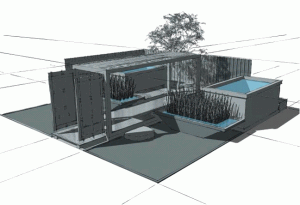Water oasis in an industrial setting
Industrial-sized dumpsters, mini skips, a shipping container and exotic aquatic weeds are the four key elements in the exhibition garden being designed by Christchurch-based international designer Craig Pocock for this year’s Ellerslie International Flower Show.
Pocock says his garden is not about the exhibit but rather about the process.
Although the exhibit has a serious environmental message, it is also meant to provoke, humour, play and provide cool relief for the children.
“The exhibit goes beyond the traditional sustainability messages of biodiversity, rainwater harvesting and use of materials; it is about looking at the embodied energy of the design and how much resource goes into creating the garden/exhibit and how it is re-used after the Show.”
Pocock says by using existing industrial dumpsters, mini skips and a shipping container as the main elements in his garden the materials can be recycled after the Show being returned to be re-used for their original industrial purpose – “zero waste and zero carbon impact”.
The “garden” is currently being constructed in an industrial backyard in Hornby and will be transported to the Show for installation.
Two industrial-sized dumpsters will sit at the rear of the exhibit on either side of the 10m x 10m exhibition space, being converted into two swimming pools. These will be separated by a deck made from recycled timber left in a natural state. Two mini skips are adjacent to the pools, planted in exotic weeds which provide a natural filtration system for the two swimming pools. “The plants will be harvested from the wild where they are presently unwanted and mulched and used as compost post-Show.”
At the front of the exhibit is the shipping container providing the entrance to the garden, as well as shelter and shade and the link with the deck. This will be used at Ellerslie to show the video which Pocock will make about the process in creating the garden.
His idea for the garden came from the use of industrial dumpsters in New York and London as swimming pools and spa pools. The containers are lined and filled with water and used by the community for short periods of time before being reclaimed for their original use. He wanted to take it one step further than the New York and London examples by adding a “portable” wetland filtration system for each pool.
The shipping container has been chosen because many countries import more than they export and are inundated with mountains of shipping containers which are stacked so high that in some communities in cities such as Los Angeles lose the sun an hour early.
Pocock spent 10 years works overseas in such countries as Jordan, Palestine, India and New York where he gained a great appreciation for the world’s rapidly depleting resources and the need to do more than pay lip service to sustainability when designing landscapes.
He says it is ironic that landscape architects are responsible for creating our environment yet in most case the carbon footprint is significantly higher than the landscape can ever offset adding to climate change
“As landscape architects, we should be aiming to create landscapes with longevity that will survive changing demographics, community growth and fashion trends. Our landscapes need to be timeless designs that serve a community well for decades to make the most of the embodied energy costs that comes with creating and maintaining a landscape, especially our urban spaces”.
With his Ellerslie International Flower Show exhibit, Pocock says he wants visitors to the Show to think about how they create their landscapes and to consider environmental and ethical issues with the material choices they make.
He has titled the garden 0800 POOL HIRE, a tongue-in-cheek name which “plays on our love of consumerism and the ease and enthusiasm in which the market is willing to supply us”.



